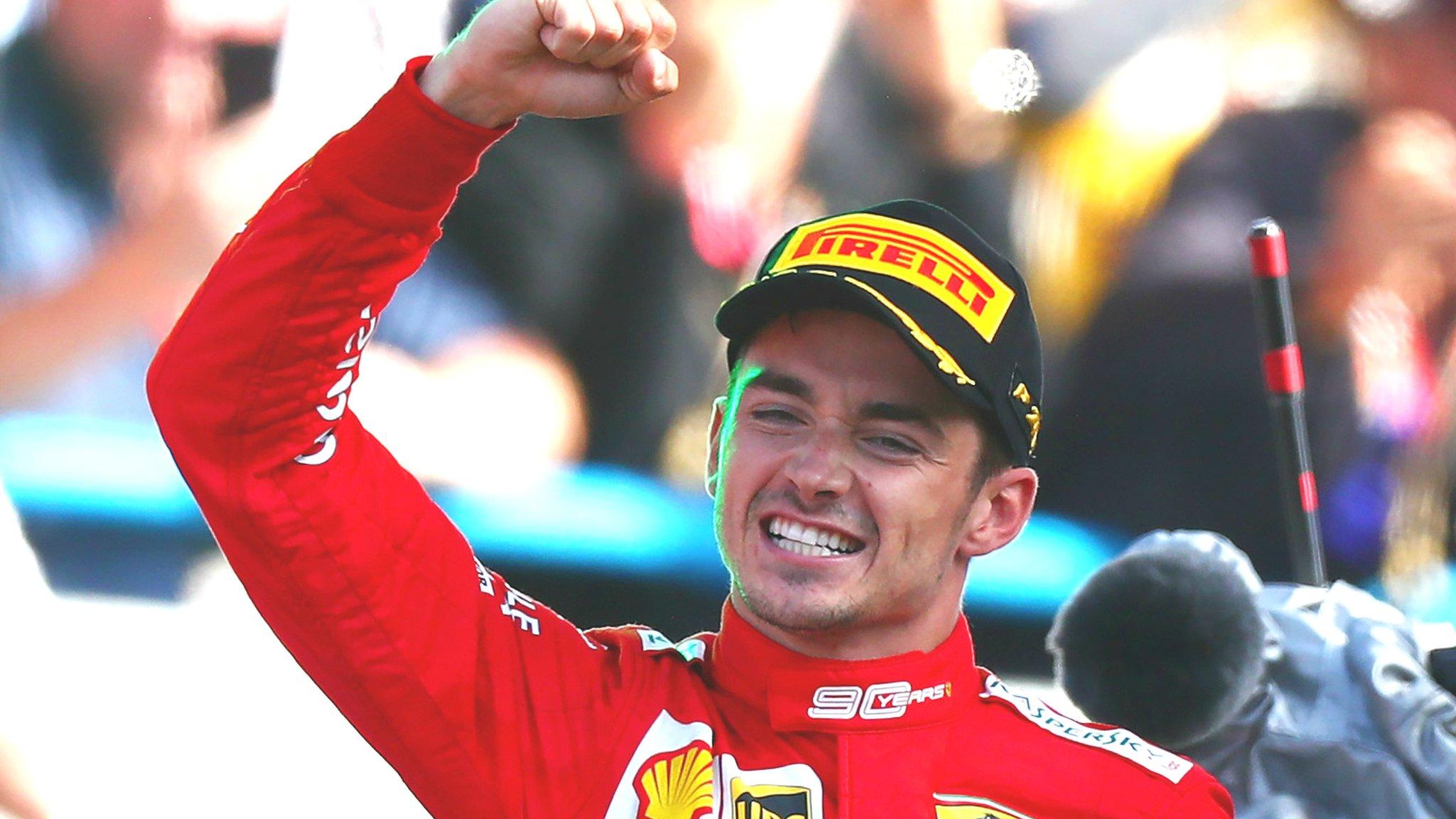Charles Leclerc's rise has obvious ramifications for Sebastian Vettel
- Published
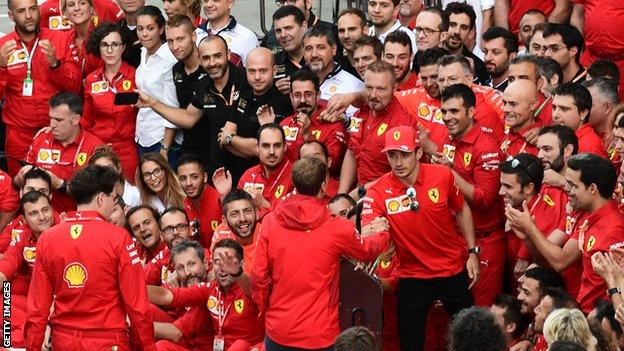
The contrast between the two Ferrari drivers after the Italian Grand Prix could not have been more extreme.
Charles Leclerc stood on the podium as a winner for a second time in a week, soaking up the adoration of thousands of tifosi celebrating the first Ferrari win in Italy since 2010.
Down in the paddock, Sebastian Vettel, the four-time world champion who started the season as the team's number-one driver, was facing the media, forced to talk about the latest in a long line of errors that date back to June 2018.
This was Vettel's ninth major mistake in 27 races since last year's French Grand Prix. He has been keeping up a hit rate of one every three events and if he is bemused and perplexed by what is going on, he is far from the only one inside Formula 1.
This one was quite possibly the worst of the lot. Most of the others have come in battle with another car, or under pressure. In this, he was running in fourth place, keeping pace with the three leaders - Leclerc and the two Mercedes of Lewis Hamilton and Valtteri Bottas - when he simply lost control and spun going through the Ascari chicane on the sixth lap.
That would have been bad enough, but then came the really unbelievable part. Vettel set about rejoining the race without looking for or apparently thinking about any other cars, and he collided with the Racing Point of Lance Stroll, who was running in seventh place.
It was akin to pulling out of a T-junction without looking if anyone was coming. An astonishing error for any racing driver to make, let alone one of Vettel's experience and expertise.
And it was all the more astonishing given that Vettel put himself in a position to be T-boned at high speed, exactly the same situation that led to the death of Formula 2 driver Anthoine Hubert at the Belgian Grand Prix.
He had no explanation.
"Obviously I am not happy with it," he said. "I lost the rear and couldn't catch it.
"I struggled a couple of times to get the car going. A couple of times I got the anti-stall and I struggled to get in the right direction as well so I couldn't see him. It was impossible to see the cars on the left. I was stuck also a bit on the kerb so that didn't help."
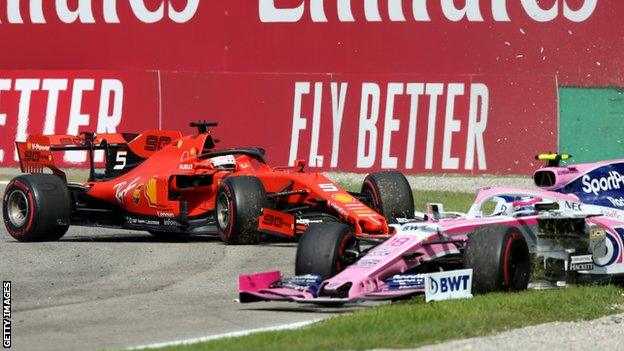
Sebastian Vettel explained his dangerous bid to rejoin the track: "I struggled to get in the right direction so I couldn't see him. It was impossible to see the cars on the left"
He was clearly thinking that the fastest cars would have built a gap and he might have clear track to rejoin. But it was still early in the race, and the gap was never going to be that big.
On the face of it, this appears to have fit into a pattern that seems familiar with Vettel's errors in recent times. In stressed moments, a sort of red mist seems to descend that reduces his capacity for rational thinking.
The concerning thing is that the errors keep happening. After making a series last year, Vettel was supposed to go away for the winter and think about how to stop it happening. But they have continued into 2019 with more or less the same frequency.
Vettel said the qualifying controversy had not affected him, and that he had not lost any love for F1.
"No, not really, I haven't," he said. "I still love what I do but when you're not doing well when you know you can do well, you can't be happy."
Mercedes team boss Toto Wolff advised against criticising Vettel too much.
"Today is a bad race for him," Wolff said. "He had a spell of bad races. I'm just saying don't write him off because he is a four-time world champion and the difference between the great ones and the good ones is that the great ones are able to get up again. I have no doubt he can do that."
Hamilton said something similar after the last big Vettel error. Problem is, right now there is not a lot of evidence to suggest they are right.
A bad mistake at a bad time
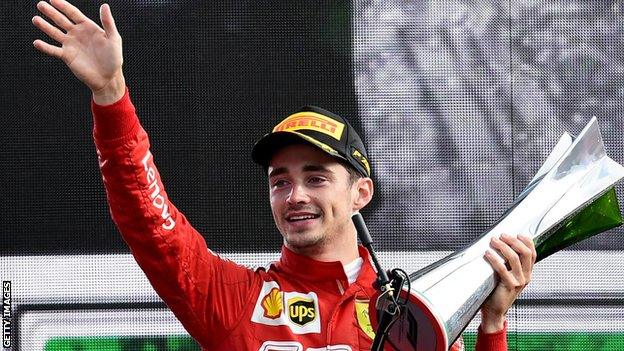
Leclerc has usurped Vettel as Ferrari's number one driver after out-qualifying him in the past seven races and winning the last two
It could not have come at a worse time for Vettel. As Leclerc has come on increasingly strongly this season, discussion about the ramifications for Vettel has continued.
Monza was the seventh race in a row at which Leclerc had out-qualified Vettel. There were extenuating circumstances this time - Vettel did not have a slipstream on his first lap and the farcical end to qualifying prevented him doing another - but a clear pattern is emerging.
And now Leclerc has won two races while Vettel is still to get off the mark this year. Looking at the remaining races - the tracks they are on, and the pattern of Ferrari's form - it is far from certain he will get another chance.
True, Vettel would have won in Canada had he not made the mistake of running off the track, crowding Hamilton on his return and earning the controversial penalty that ensued, but that was the only time he has vaguely looked like a winner this year while Leclerc should have won in Bahrain and could have won in Baku and Austria.
On Saturday, Vettel was very unhappy with Leclerc's failure to work out a way through the traffic and give him a tow for the second runs in qualifying, as had been agreed.
That had already increased the tension in the team. So, his status as team leader already under serious threat, Vettel could have done with a strong race, challenging Leclerc, helping out in the fight with Mercedes, to start re-establishing his position.
Instead, this.
Vettel has another year on his Ferrari contract, but the way things are going he will have gone, within the space of one year, from the team's lead driver to a de facto support act to Leclerc. He is a proud man and is unlikely to take kindly to that.
Right now, for Vettel, it is hard to know what comes next.
Leclerc gets better and better
While Vettel endured one of the worst races of his career, his team-mate was out front confirming his status as a major new star in F1.
This was a superb win, albeit a somewhat controversial one, a great drive in a thrilling race, in which Leclerc had to sustain the most intense pressure from one Mercedes driver or another for the entirety of the race distance.
It was an absolutely fantastic grand prix to watch and overall a superlative drive by Leclerc. But there were a couple of shaky moments.
On lap 23, Hamilton got a run on Leclerc into the second chicane after the two had overtaken Nico Hulkenberg's out-of-stop-sequence Renault down the main straight.
The world champion went for the outside and Leclerc moved over on him, Hamilton edging on to the grass to avoid a collision.
Leclerc seemed to have come perilously close to breaking the rule that says a driver moving back to the racing line to defend his position must leave at least a car's width on his outside. He said he thought he had; Hamilton said he definitely had not.
In last year's Italian Grand Prix, Max Verstappen pulled a very similar move on Bottas at the first chicane and was given a five-second penalty. But Leclerc got away with a black-and-white warning flag - the equivalent of a yellow card in football.
Twelve laps later, Leclerc locked up at the first chicane and clattered over the run-off area. Again, Hamilton got a run on him, and this time Leclerc defended robustly through the flat-out Curva Grande, moving very late to block Hamilton to the Ferrari's left.
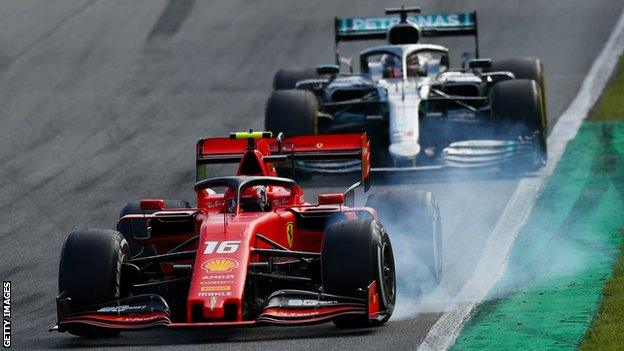
Leclerc was put under severe pressure by Lewis Hamilton but doggedly refused to relinquish his lead
"There is some dangerous driving going on," Hamilton said over the radio. The stewards did nothing.
Leclerc admitted he was hard, but said: "I just tried to be at the limit of what is acceptable.
"I knew he was on the right (at the chicane). He braked a bit early because he didn't want to try around the outside. I thought I had left a car's width."
His approach has been informed by the fact that Verstappen got away with barging him wide when he passed the Ferrari for victory on the penultimate lap in Austria a couple of months ago.
"Since Austria it is clear we can go a bit further in the way we can defend and overtaking in the aggression," Leclerc said. "Austria helped me change that approach. It was thanks to this I managed to win. It was very on the limit but I am happy to race like this."
Hamilton sounded less convinced.
"It was interesting," Hamilton said. "I learnt a lot about his character today as a driver, as you do when you're racing with different drivers and I will know better for next time.
"There were a couple of surprises - the ones you saw. But it is just all knowledge for the future.
"We've just constantly asked for consistency. There was a rule put in place and it wasn't abided by today and they used different consequences for the rule. I don't really know why that's the case. It's motor racing and I guess the stewards woke up on the different side of the bed.
"If Verstappen should have got that last year, then the same rule should apply."
'No problem with Leclerc,' says Hamilton
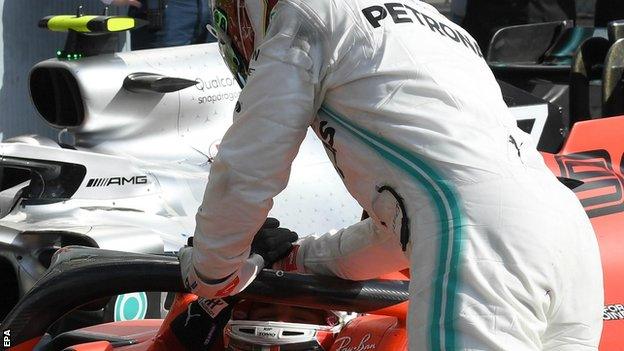
Hamilton was one of the first to shake the hand of Leclerc in the parc ferme after their epic battle at Monza
So far, the relationship between Hamilton and Leclerc has been respectful and warm, and the older man said there was no reason for that to change.
"There is no lack of respect between drivers," he said. "There is no problem. I congratulated him as soon as I got out of the car. He is one of the most respectful drivers.
"This is the first time I've gone wheel to wheel with him. You learn how drivers approach different scenarios and maybe I would position my car differently next time and do a better job next time."
Hamilton said that, had the title not been at stake, he would have driven differently: "I wouldn't have moved and we would have collided."
He added: "He did an exceptional job. We don't have a problem. If we get a moment together, we might chat and reverse roles and make sure he's OK if I do the same. If that's cool, that's racing. There is no issue.
"It is good we are able to race hard and today was a tough battle, which is good.
"He did a fantastic job. I gave as much pressure as I could. We had a couple of close moments. We can probably talk about it in private but it is nothing major. We continue to race. I am looking forward many more races together."
- Published8 September 2019
